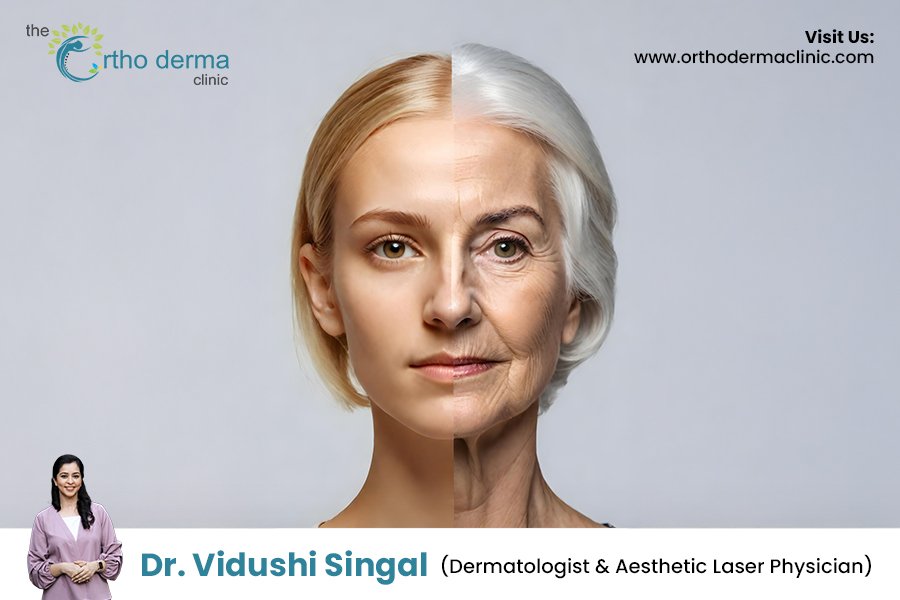When we think of skin aging, most of us picture fine lines, wrinkles, or sagging skin. But aging skin is much more than what meets the eye — it’s a complex biological process influenced by genetics, lifestyle, environment, and skincare habits.
Dr. Vidushi Singal, Dermatologist at Orthoderma Clinic, helps us understand the real science behind skin aging — and how you can slow it down with the right care and treatments.
1. The Science of Skin Aging
Skin aging is a gradual process that affects all layers of the skin — the epidermis (outer layer), dermis (middle layer), and subcutaneous fat (deeper layer).
What happens underneath:
- Collagen & Elastin Breakdown: These structural proteins give skin firmness and elasticity. With age, their production slows down, leading to sagging and wrinkles.
- Reduced Cell Turnover: Skin cells renew more slowly, making skin appear dull and uneven.
- Loss of Fat & Volume: The fat layer under the skin thins out, especially around the cheeks and eyes, resulting in hollow or tired-looking features.
- Weakened Skin Barrier: With age, the skin loses moisture more easily, making it dry and sensitive.
This combination of internal and external changes defines how our skin “ages.”
2. Intrinsic vs. Extrinsic Aging
Intrinsic (Natural) Aging
This is the genetic, biological aging process that happens over time — something we can’t control. It’s influenced by our DNA and hormonal changes.
Common signs include:
- Fine lines
- Dryness
- Thinner skin
- Slower healing
Extrinsic (External) Aging
This type of aging is caused by external factors — many of which can be controlled.
The biggest culprits include:
- Sun exposure (UV damage) – causes pigmentation, wrinkles, and loss of elasticity.
- Pollution – increases oxidative stress and dullness.
- Smoking and alcohol – accelerate collagen breakdown.
- Poor diet and stress – disrupt skin repair and barrier function.
Dr. Vidushi’s insight: Up to 80% of visible aging is due to extrinsic factors — which means the right care can significantly delay visible signs of aging.
3. Early Signs of Skin Aging You Shouldn’t Ignore
Aging doesn’t happen overnight. The process often starts in your mid to late 20s, with subtle signs that gradually become more noticeable:
- Loss of glow and even tone
- Fine lines around the eyes and mouth
- Uneven texture or pigmentation
- Dullness and dryness
- Mild skin laxity around the jawline
Identifying these early signs helps you take preventive steps before deeper damage sets in.
4. How to Slow Down Skin Aging Naturally
While you can’t stop time, you can definitely slow down how it shows on your skin.
Sun Protection — Your #1 Anti-Aging Step
Use a broad-spectrum sunscreen (SPF 30 or above) daily, even indoors. Reapply every 2–3 hours. UV rays are responsible for most premature aging.
Eat Skin-Friendly Foods
Antioxidants help neutralize free radicals that cause cellular damage. Include:
- Vitamin C-rich fruits (orange, kiwi, amla)
- Vitamin E sources (almonds, sunflower seeds)
- Omega-3 fatty acids (flaxseed, walnuts, salmon)
Stay Hydrated
Drink plenty of water and include hydrating serums (like hyaluronic acid) to maintain skin’s plumpness.
Sleep Well
During sleep, your body repairs and regenerates skin cells. Aim for 7–8 hours of quality sleep.
5. Medical & Advanced Treatments to Combat Aging
Modern dermatology offers effective, minimally invasive treatments to rejuvenate the skin and slow visible aging.
Botox & Fillers
Relax fine lines and restore lost facial volume for a natural, youthful look.
Laser Skin Rejuvenation
Improves texture, tightens skin, and reduces pigmentation by stimulating collagen production.
Chemical Peels
Remove dead skin cells and promote new cell growth for smoother, radiant skin.
HydraFacial / PRP / Exosome Therapy
Boost hydration, repair damaged cells, and restore glow using regenerative ingredients and growth factors.
Each treatment plan should be personalized based on age, skin type, and concerns — ideally under the supervision of a qualified dermatologist.
6. Consistency Is Key
No single cream or facial can stop aging overnight. What truly makes a difference is consistent care — gentle cleansing, moisturization, sun protection, and regular dermatologist checkups.
Dr. Vidushi Singal’s advice:
“Aging is a natural process, but premature aging isn’t. The earlier you start protecting and nourishing your skin, the longer it stays youthful, healthy, and radiant.”
Final Thoughts
Skin aging goes far beyond wrinkles — it’s a reflection of your lifestyle, health, and skincare habits. By understanding what causes it and addressing those factors early, you can age gracefully with confidence and glow.
Whether you’re in your 20s looking for prevention or in your 40s seeking rejuvenation, Orthoderma Clinic offers advanced, science-backed anti-aging treatments tailored to your skin’s needs.
